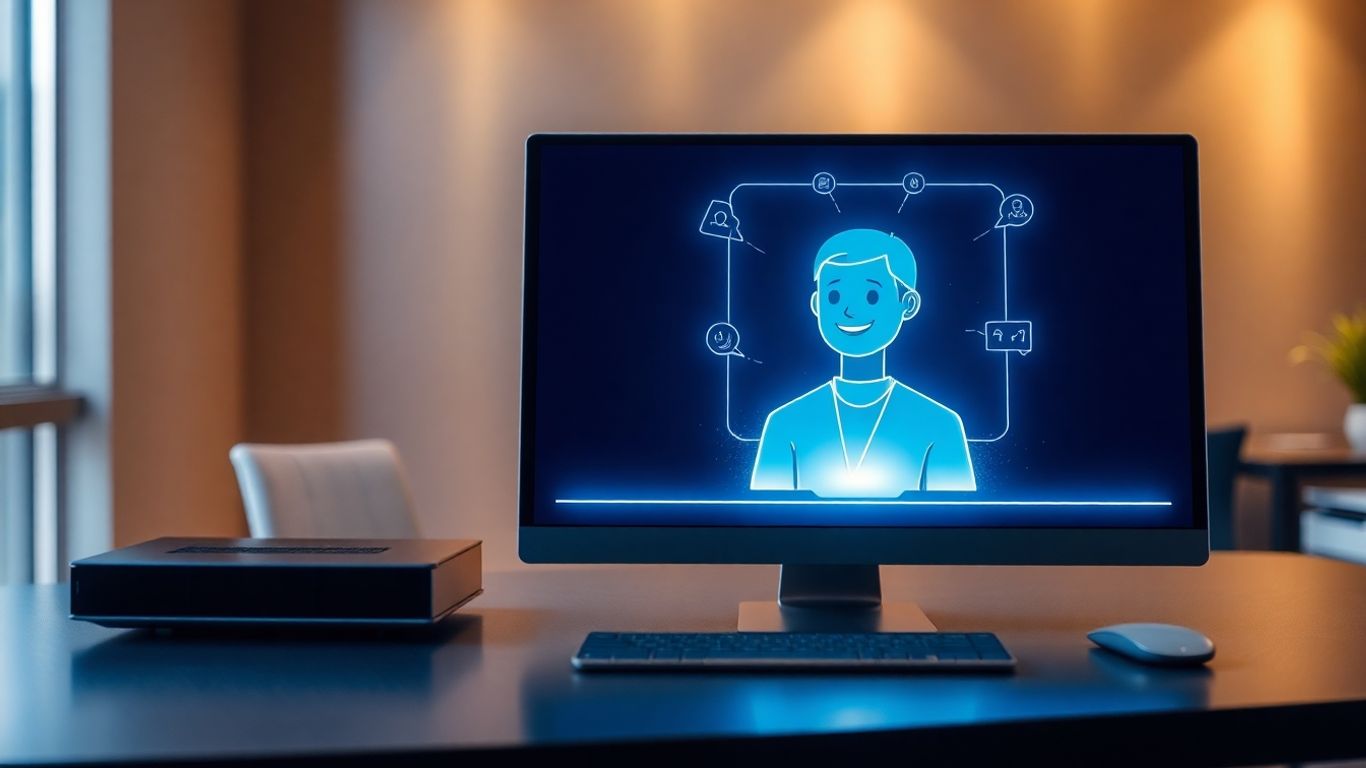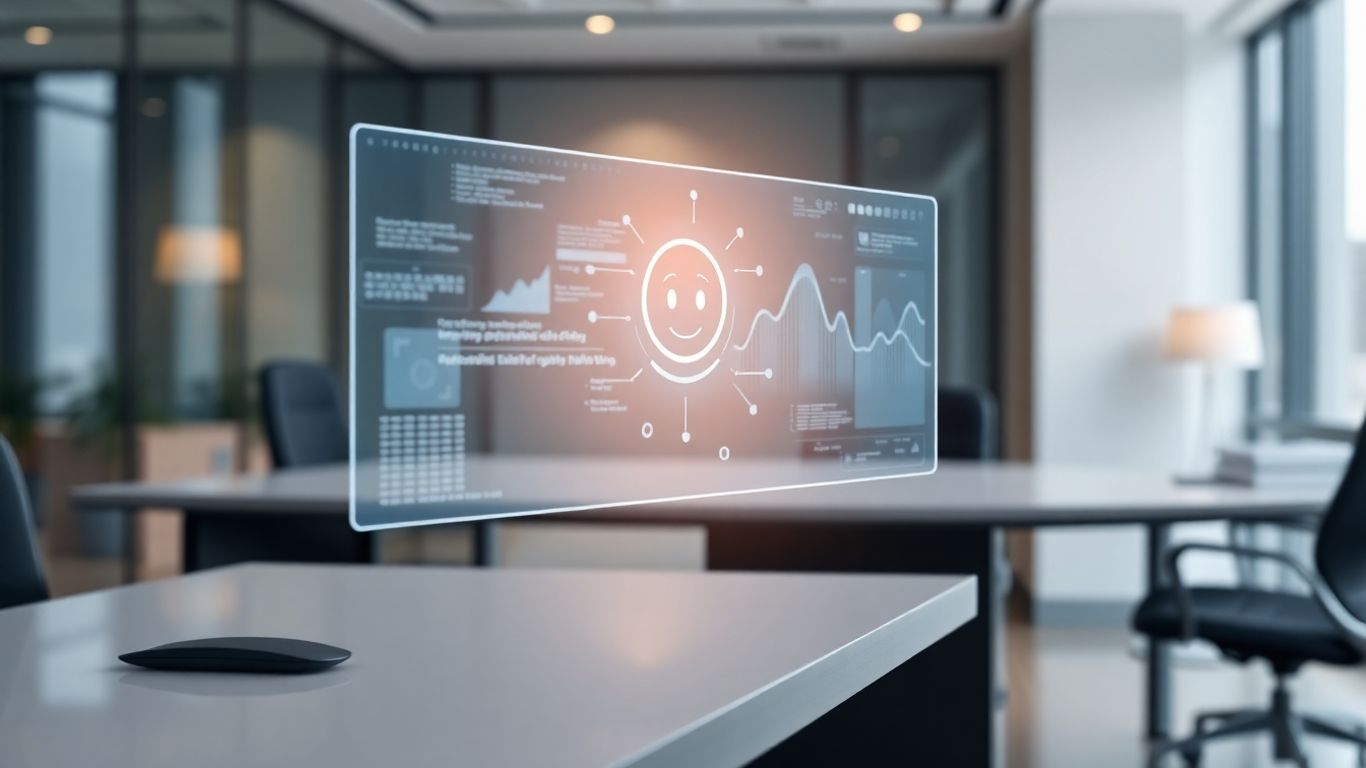So, you're probably wondering how this whole AI front desk thing actually works, right? It’s not some magic trick; it’s pretty smart technology designed to make your life easier and your business run smoother. Think of it as a super-efficient virtual assistant that handles all those incoming calls and messages, freeing up your human staff for more important tasks. It’s really about making that first point of contact for your patients as helpful and painless as possible. AI receptionists are changing the game for how businesses talk to people. Instead of a person trying to answer phones, book appointments, and answer common questions all at once, an AI can do all of that. It’s built to understand what callers need and respond in a way that feels natural. This means your business can handle more inquiries without missing a beat.
So, how does this whole AI receptionist thing actually work? It’s not some kind of magic trick; it’s pretty smart technology designed to make your business run smoother. Think of it as a super-efficient virtual assistant that handles all those incoming calls and messages, freeing up your human staff for more important tasks. It’s really about making that first point of contact for your customers as helpful and painless as possible.
At its heart, an AI receptionist is built to understand what callers need and respond in a way that feels natural. It’s trained to know about your business, like your services and hours, so it can help callers with their questions and tasks. This means your business can handle more inquiries without missing a beat.
In today's world, first impressions really matter. An AI front desk acts as your business's first point of contact. It’s not just about answering the phone; it’s about making that initial interaction positive and helpful, even when your human staff is busy. This technology can answer frequently asked questions, provide basic service information, and even guide callers on what to do next. It’s like having an extra team member who’s always available and always knows the answers.
Here’s a quick look at what an AI receptionist can handle:
AI receptionists use advanced computer programs that can understand spoken words and respond in a natural way. This is thanks to Natural Language Processing (NLP), which allows the AI to interpret the nuances of human speech. It's built to chat in a way that feels natural, like you're talking to someone who actually works at the practice. This means callers don't get that jarring, robotic experience that can make them feel like they're talking to a well-organized, caring business. The AI doesn't just answer quickly; it thinks quickly. Ask it a complex question, and it doesn't miss a beat. It's like talking to the smartest person you know, but one who never needs to pause to think.
The speed of these interactions is key. Response times measured in milliseconds are quick enough to keep up with natural conversation, turning what could be a frustrating interaction into a smooth, natural conversation. It's the difference between feeling like you're talking to a machine and feeling like you're talking to a hyper-competent human.

So, you're thinking about getting an AI receptionist. That's a smart move. These systems aren't just fancy answering machines; they're built with some pretty neat capabilities that can really change how your business handles communication. Let's break down what makes them stand out.
This is a big one. Unlike your human staff who need breaks, sleep, and maybe a coffee refill, an AI receptionist is always on. It doesn't matter if it's a holiday, the middle of the night, or a Sunday morning; the AI is ready to answer calls and help your customers. This constant availability means you never miss an opportunity, especially with new clients who might just call a competitor if they can't get through right away. It’s like having a dedicated employee who never calls in sick and is always ready to assist, providing a consistent experience no matter the hour.
Forget the back-and-forth emails or phone tag to book a simple meeting. AI receptionists can directly interact with your calendar. When a caller wants to schedule, the AI can check your availability in real-time, offer open slots, and book the appointment. It can also handle rescheduling or cancellations. This frees up your team from managing the schedule and reduces the chance of double bookings or missed appointments. It’s a smooth process that makes it easy for customers to get on your books.
Most businesses get the same questions over and over: What are your hours? Where are you located? What services do you offer? An AI receptionist can be programmed with all this information. It can access a knowledge base and provide instant, accurate answers to these common queries. This not only saves time for your staff but also gives callers the information they need quickly, without having to wait for a human to become available. It’s about providing immediate support and information, making the customer's experience that much better.

So, how does this whole AI receptionist thing actually work? It's not magic, it's pretty smart tech designed to make your business run smoother. Think of it as a super-efficient virtual assistant that handles incoming calls and messages, freeing up your human staff for more important tasks. It’s really about making that first point of contact for your callers as helpful and painless as possible.
This is the core of how the AI understands what people are saying. Natural Language Processing, or NLP, is what allows the AI to interpret human speech, figure out the intent behind the words, and then formulate a relevant response. It’s built to chat in a way that feels natural, like you're talking to someone who actually works at the practice. This means callers don't get that jarring, robotic experience that can make them feel like they're talking to a well-organized, caring business. The AI sticks to pre-approved scripts and maintains a steady, friendly manner, representing your business exactly how you want it to be seen.
Machine learning (ML) is what makes the AI get smarter over time. It learns from every interaction. If a caller asks a question the AI didn't quite get the first time, it logs that. Then, with more data and feedback, it refines its understanding and response for next time. This means the AI receptionist becomes increasingly sophisticated, offering more accurate and helpful answers as it goes. It’s like having a receptionist who’s always learning and improving, making sure your business always looks its best.
Most people don't realize how much response time matters in a conversation. But it really does. An AI receptionist is fast. We're talking response times measured in milliseconds. That's quick enough to keep up with natural conversation, turning what could be a frustrating interaction into a smooth, natural chat. It’s the difference between feeling like you're talking to a machine and feeling like you're talking to a hyper-competent human. This speed isn't just a neat trick; it's transformative. It means no more waiting around for a slow, robotic answer. The AI doesn't just answer quickly; it thinks quickly. Ask it a complex question, and it doesn't miss a beat. It's like talking to the smartest person you know, but one who never needs to pause to think.
An AI receptionist isn't just a standalone tool; it's designed to be part of your business's larger ecosystem. Making sure it plays nicely with your existing software is a big deal. Think of it like adding a new team member who needs access to all the right files and tools to do their job effectively.
One of the most common tasks for any receptionist, human or AI, is managing appointments. Your AI receptionist needs to be able to talk to your calendar software. This means when someone calls to book a meeting, the AI can check your availability in real-time and slot that appointment right into your schedule. No more double bookings or missed appointments.
Beyond just scheduling, an AI receptionist can be a powerful tool for your Customer Relationship Management (CRM) system. When a new lead calls, the AI can log their details directly into your CRM, perhaps even noting the reason for their call. This keeps your sales and support teams informed and ready.
Integrating your AI receptionist with your CRM means that every interaction, even a simple phone call, becomes a data point that helps your business understand its customers better. This information can then inform marketing efforts, sales strategies, and customer service improvements.
Other software integrations can include:
Zapier is a service that connects different web applications, allowing them to
So, you're thinking about getting an AI receptionist. That's a smart move. It’s not just about having a fancy gadget; it’s about making your business run smoother and making your customers happier. Let’s break down why this technology is such a big deal.
Think about the cost of a human receptionist. You’ve got salary, benefits, training, and the occasional coffee run. An AI receptionist, on the other hand, works around the clock without needing breaks or overtime pay. It's a fixed, predictable cost that’s often much lower than hiring staff, especially when you consider it can handle tasks that might otherwise require multiple people. Plus, it doesn't call in sick or take vacations. This consistent availability translates directly into savings.
Nobody likes waiting on hold or getting a busy signal. An AI receptionist can handle multiple calls at once, meaning fewer missed connections and shorter wait times for your callers. It can answer frequently asked questions instantly, book appointments, and provide information 24/7. This immediate, reliable service makes a great first impression and shows your customers you value their time. It’s like having a super-efficient, always-available team member who knows all the answers.
When your AI receptionist takes care of the routine calls and basic inquiries, your human team can focus on what they do best: handling more complex issues, building relationships with clients, and performing specialized tasks. This not only makes your staff more productive but also increases job satisfaction, as they’re not bogged down by repetitive phone duties. It allows your business to operate more efficiently by allocating human talent where it’s most needed.
The initial interaction a caller has with your business sets the tone for their entire experience. An AI receptionist is designed to make this first contact positive and helpful, even during your busiest periods or after hours. This consistent, professional approach builds trust and can significantly impact how customers perceive your brand.
Remember when businesses used to worry about phone lines like they were made of gold? "Oh no, all our lines are busy!" they'd cry, as if Alexander Graham Bell himself had personally limited them to five calls at once. Well, we fixed that. Our AI receptionist doesn't just handle multiple calls. It handles ALL the calls. At once. Forever. It's like we gave it an infinite supply of ears and an attention span that would make a zen master jealous.
Your human receptionists are great, but they can only manage one phone call at a time. If your business gets busy, calls can go unanswered, or customers might be put on hold for a while. An AI receptionist, however, can manage a large number of calls all at once. It doesn't get overwhelmed. This means that whether one person is calling or twenty, everyone gets a response quickly. It's like having a whole team of receptionists working around the clock, but without the extra costs.
When your business gets busier, the front desk can easily become a bottleneck. Customers might face longer waits to book appointments or get simple questions answered. An AI receptionist solves this by being available 24/7 and capable of handling many calls at once. This means customers get help whenever they need it, which generally makes them happier. It also allows your human staff to focus on customers who are physically present, improving their in-office experience. This ability to manage more without needing more people is a big deal for growing your business without the usual administrative headaches.
Our AI doesn't just handle calls, it tidies them up and thanks them for sparking joy. Peak periods? More like "meh" periods. Black Friday, a popular TV show just aired, a sudden local event? Bring it on. This is scalability on steroids, consistency that would make a Swiss watch blush, and the fact that "busy signal" is now as obsolete as the floppy disk.
Why should you care? Because it means happy customers, your business stays alive even when that influencer accidentally puts your phone number in their Instagram story, and you can scale without the growing pains. Your brand consistency remains intact whether it's the first call of the day or the ten thousandth. Plus, every call becomes an insight, like some sort of customer service Pokémon trainer catching them all. Imagine your product goes viral and thousands of calls pour in. Your AI doesn't break a sweat. It's like the phone equivalent of that "This is fine" meme dog, except everything actually is fine.

So, you've got this AI receptionist ready to go, but how do you make sure it's actually doing what you need it to do? It's not just a one-size-fits-all deal. You get to tweak things, set boundaries, and really mold it to fit your business. Think of it like having a really smart assistant who you can train to be exactly the kind of help you need.
One of the first things you'll want to control is when your AI receptionist is actually

So, you've got this AI receptionist handling calls, which is pretty neat. But what happens after the call? That's where the real gold is, in the data. It’s not just about answering the phone; it’s about learning from every single interaction. Think of it like having a super-detailed logbook for every conversation your business has over the phone.
One of the most direct ways to see what’s happening is by looking at the actual conversations. Your AI receptionist service will typically provide access to:
Just having the data isn't enough, right? You need to make sense of it. Analyzing these transcripts and voicemails can show you patterns you might otherwise miss. For example:
The real power of AI analytics in this context is its ability to process a massive amount of conversational data quickly. It can find trends and anomalies that a human might overlook, especially when dealing with a high volume of calls. This continuous feedback loop allows the AI to get smarter and your business to adapt more effectively.
Ultimately, you want to know how this is impacting your business. The analytics should connect back to real results:
So, you've decided an AI receptionist is the way to go. That's great! But with so many options out there, how do you pick the one that actually fits your practice? It’s not just about finding the cheapest or the one with the most bells and whistles. You need something that works with your current setup and makes life easier, not more complicated. Think of it like choosing a new team member – you want someone reliable, efficient, and who represents your practice well.
First things first, what does your practice really need an AI receptionist to do? Sit down and make a list. Are you mostly looking to book appointments and answer basic questions about hours or services? Or do you have more complex patient needs that require handling? Maybe you need it to help with initial patient intake or send out appointment reminders. Jotting down these core functions gives you a clear starting point. Don't just think about today, either. Consider what your practice might need in the next year or two as you grow. For example, if you anticipate needing to handle more patient inquiries via text, make sure the platform supports that. Some services are really good at just answering calls, while others can manage appointment scheduling via text messages, which can be a real time-saver.
Once you know what you need, it's time to see who's out there. Different AI receptionist companies have different strengths. Some might be really good at just booking appointments, while others can handle more detailed conversations. It’s a good idea to check out vendor websites, read reviews, and see if they have case studies from other healthcare practices, especially ones similar to yours. Many services offer free trials, which is a great way to test them out in your own office before you commit. Pay attention to how natural the conversations sound – you don't want patients getting frustrated with something that feels too robotic. You want interactions that feel like a real person, not a clunky automated system.
This is a big one. An AI receptionist shouldn't exist in a vacuum. It needs to play nicely with the tools you already use. Think about your existing calendar systems, your patient management software, or even your CRM. How easily does the AI platform connect with these? Some services boast integrations with thousands of apps and dozens of CRMs, which can make a huge difference in streamlining your workflow. Getting a clear picture of all potential expenses upfront, including setup fees or charges for connecting with your existing software, is also important. A slightly more expensive option that integrates perfectly might save you more money and hassle in the long run than a cheaper one that doesn't quite fit.
When you're comparing platforms, think about the long-term. A system that integrates well now will save you headaches later. It's about building a connected front desk that works for you, not against you.
It's also worth considering how the AI handles different types of communication. Can it just answer calls, or can it also respond to text messages? Does it support multiple languages if you have a diverse patient base? Understanding these capabilities will help you choose a platform that truly meets your practice's needs and can grow with you. Remember, the goal is to make your front desk operations smoother and more professional, and the right AI receptionist is a key part of that.
The world of AI is always moving, and what seems cutting-edge today will likely be standard practice tomorrow. By adopting an AI receptionist now, you're not just getting a tool for the present; you're investing in a system that can evolve with technology. Future AI receptionists might be able to do even more, like proactively reaching out to customers or offering more personalized support based on past interactions. Staying with an AI solution means you're positioned to easily adopt these new features, keeping your business at the forefront of customer communication and operational efficiency.
We're seeing AI move beyond just answering phones. Think about AI that can predict customer needs before they even call, or systems that can handle complex troubleshooting steps. AI is also getting better at understanding different languages and even regional accents, making it more accessible to a wider audience. Plus, the integration of AI with other business tools is becoming more sophisticated, allowing for truly automated workflows.
AI assistants are no longer just simple chatbots. They're becoming more like digital team members, capable of handling a wider range of tasks. We're talking about AI that can manage your calendar, draft emails, and even conduct initial customer interviews. As AI gets smarter, its role will expand from just handling calls to becoming a central hub for managing customer interactions and business operations.
Adopting AI isn't just about staying current; it's about preparing for what's next. Businesses that embrace AI now will be better equipped to adapt to future technological shifts and customer expectations. It's about building a flexible and efficient operation that can scale and change as needed.
Here's a look at what the future might hold:
The pace of AI development means that what seems like a futuristic concept today could be a common business tool in just a few years. Businesses that are willing to explore and integrate these technologies will likely find themselves with a significant competitive advantage. It's about building a foundation that can adapt and grow, rather than getting left behind by rapid advancements in how we communicate and operate.
Imagine a world where your business never misses a call. AI receptionists are making this a reality, handling calls, setting up meetings, and answering questions around the clock. It's like having a super-efficient assistant for your phone. Want to see how this smart tech can help your business? Visit our website to learn more!
Alright, so we've gone through how these AI receptionists actually work. It's pretty wild, right? They can answer calls, book appointments, and basically act like a human, but they're available 24/7 and don't need coffee breaks. They connect with other tools you probably already use, which is a big deal for keeping things running smoothly. Plus, they can handle a ton of calls at once, so you're not missing out on potential customers just because things get busy. It really seems like a smart way to handle the front desk stuff, letting your actual team focus on more important things. It’s not some futuristic dream anymore; it’s here and it’s making a difference for businesses.
An AI receptionist is like a virtual assistant for your business. It uses smart computer programs to answer phone calls, schedule appointments, and help people who contact you, similar to how a human receptionist would, but it can work all day and night.
It uses advanced computer technology that can understand spoken words and reply in a way that sounds natural. It's taught about your business, like your services and hours, so it can help callers with their questions and tasks.
Yes! AI receptionists are available 24 hours a day, every day of the week. This means people can call and get help anytime, even when your office is closed.
Yes, it can! AI can be set up to sound friendly and helpful, just like your best human receptionist. It can even greet people by name and give them personal answers, making them feel welcome.
Definitely. AI is really good at booking appointments. It can check your schedule, find available times, and book people directly into your calendar without making mistakes.
Think of it this way: AI can handle many calls at the same time without getting overwhelmed. This means fewer missed calls and shorter waiting times for people, especially during busy periods.
Yes, AI can link up with other tools you already use, like your calendar or customer database. This helps everything work together smoothly and saves your staff from doing extra manual work.
By taking care of simple tasks like answering calls and booking appointments, AI gives your human staff a break. They can then spend more time helping people directly and handling more complicated issues.
Start your free trial for My AI Front Desk today, it takes minutes to setup!








